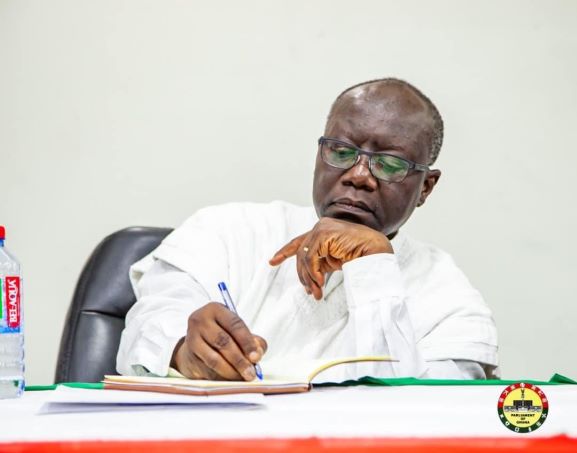A technical committee set by government has made over 20 proposals comprising expenditure cuts and revenue generation measures that have the potential to yield net savings of GH₵83.5 billion.
The IBF holds the position that the proposals are competent enough to urgently address the fiscal challenges and enable Ghana to reach the desired 55% debt-to-Gross Domestic Production (GDP) ratio target proposed to the International Monetary Fund (IMF).
However, government has pointed out the complexities with implementation given that some revenue and expenditure measures are of a medium-term nature and being considered by the government as part of its structural reform agenda and medium-term domestic revenue mobilisation strategy.
All the same, government assure that any proposal that can be implemented immediately will be considered towards a speedy resolution of the current economic crisis.
These are contained in the report of a six-member technical committee comprising representatives of Individual Bondholders Forum and officials from government.
Director of Treasury and Debt Management Division, Samuel Arkhurs and Dr. Alhassan Iddrisu, Director of Economics of Strategy and Research Division of the Ministry of Finance represented government .
Conveners Senyo Hosi, David Tetteh and Martin Kpebu represented Individual Bondholders Forum while Dr. Adu Anane Antwi, Convenor of Pensioners Bondholders Forum served as observer.
The report proposed to government to lend the $900mn Ghana Heritage Funds to the Bank of Ghana (BoG) to shore up the reserves.
It also recommended restructuring og the fiscal council to include a creditors committee made of representatives from all investor classes in local bonds and empower the council to be an enforcing and binding institution and not just an advisory body.
EXPENDITURE CUT MEASURES
GH₵3bn cut from provision for energy sector shortfall
The Committee asked government to cut the budget provision for the energy sector shortfall of GH₵23 billion by GH₵3 billion through the reduction of transmission losses, technical losses, and administrative inefficiencies.
Slash GH₵150m from premix fuel subsidies
The report also proposed a cap of the subsidies on premix fuel at GH₵200 million thereby reducing the budget by GH₵150 million.
Owing to the wanton abuse of this subsidy, it suggested discount coupons to registered fisherfolks for the purchase of premix
Slash capital expenditure to save GH₵10.7 billion
The Committee also want 2022 capital expenditure level maintained by reducing the non-Annual Budget Funding Amount (ABFA) of Ministries Departments and Agencies (MDA) as well as foreign finance Capex provisions by 50% to save GH₵10.7 billion.
Cut statutory funds to save GH₵7bn
Per the report, except for District Assemblies Common Fund (DACF), National Health Fund (NHF) and Ghana Education Trust Fund (GETFund), the transfers to all other statutory funds should be reduced significantly from the 15% of tax revenues approved in the 2023 budget to 10%.
It proposed special focus on Ghana National Petroleum Corporation (GNPC), Ghana EXIM Bank and Minerals Income Investment Fund (MIIF) to save GH₵7 billion.
Cut Ministers, MDAs to save GH₵6.5 billion
The Committee called drastic reduction in the number of MDAs, Ministers, and staff at the Office of Government Machinery to save GH₵6.5 billion.
Review Free SHS to save GH₵1 billion
It proposed review of Free SHS e to make it more efficient through effective targeting and allowing parents who can pay to do so to save GH₵1 billion
Beneficiaries should be students that patronize Senior High Schools in their communities whilst other students should pay for boarding. However, the government can pay for students who do not have Senior Secondary schools in their communities.
REVENUE MEASURES
GH₵104 savings
Enforce the filing of interest/coupon income on corporate instruments (ESLA, Daakye, Cocoa bills) as part of Personal Income Tax (PIT) and effect the 25% tax related to the income.
Alternatively, revise the 1% withholding of the related securities 9 to 20% and make it final and deductible at the source.
This 9 creates additional revenue of circa GH₵104 million for the current fiscal year.
GH₵3.6bn from oil production
Oil production has dropped from over 200kbpd to below 160kbpd yield revenue loss more than $300mn (GHS3.6bn) in 2022.
The government should, as a matter of urgency, review the regulatory and fiscal environment to encourage existing producers to ramp up production and develop new fields.
GH₵5.6bn from yet to be tapped oil fields
Government should exercise its right under the Aker petroleum agreement (Deepwater Tano) to repossess the block or compel the immediate commencement of development by the contractor. This field has the potential of delivering up to 100kbpd yielding over GHS5.6bn per year to the government.
GH₵1.1bn from property taxes
Expedite reforms to enforce property taxes. With landed properties of circa 2,200,000 in Ghana (Ghana Population and Housing Census 2021), we anticipate that achieving an average annual rate of GH₵1,000 per property at a collection efficiency of 50%, will yield the government over GH₵1.1 billion in revenue.
GH₵3.6bn from fully enforcing VAT
Rise above politics and fully enforce the VAT invigilation that saw the rise of VAT revenue by 1000% in some cases.
This assumes a 15% over the 2023 estimated VAT collection of GH₵23.7 billion
GH₵13.9bn from Auditor General’s reports
Pursue the recovery of funds lost through financial irregularities of MDAs in the Auditor General’s Reports (2015-2022). Source: 2nd Fiscal Recklessness Index Report, 2020 (page 2).
GH₵5bn tax evasion by petroleum downstream sector
Pursue the recovery of the over GH₵5 billion tax evasion in the petroleum downstream sector (2016-2021). Source: CBOD Petroleum Industry Report 2020/21.
GH₵1bn from divesting 17 loss-making SOES
Divest loss-making, defunct and troubled 17 State-own enterprises (as identified and announced by the Ministry for Public Enterprises).
GH₵20bn from privatizing SOEs
Privatize selected SOEs to Tier-2 pension funds to drive efficiency and productivity.
The government will realize funds from the divestiture with ownership still retained by the workers of Ghana.
These SOEs may include the Electricity Company of Ghana (ECG) and Ghana RE.
GH₵1bn from rationalizing budget of SOEs
Review and rationalize the budget of SOEs and increase capping of high revenue generating SOEs to shore up central government revenue and reduce waste in SOEs.
GH₵300m from BOST Margin
The BOST Margin should be converted into a levy and channelled into government revenue.
BOST is a fully commercial entity and it is untenable to continue to tax the public to fund its activities while it charges commercial rates for its services
Revise royalties
Revise royalties for new and yet-to-renegotiate mining leases from the standard 5% to 15%.
For example, the payback period for the new lithium mines is less than five months with an internal rate of return of 224% and yet government royalties is set at 10%.
- Trump slaps tariffs: Ghana, UK-10%, EU-20%, others-50% - 2 April 2025
- BoG policy rate hike: MPC’s 3-2 vote and reasons - 2 April 2025
- Painter accused of stealing BoG cables granted GH₵1m bail - 2 April 2025

